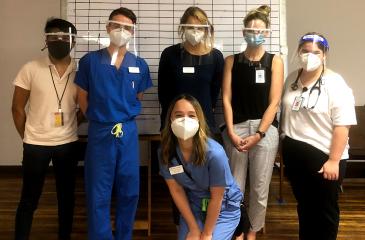I recently had a conversation with two top collaborative researchers. They attributed a significant part of their success to learning each other’s working languages and developing a shared vocabulary. Interprofessional education (IPE) gives our students the advantage of learning the roles and languages of other health care fields and practicing the communication skills needed for seamless teamwork.
We know health care teams have advantages in providing patient care—improving safety, quality, and outcomes, and lowering costs—both for individuals and populations. There is evidence that they can enhance provider wellbeing. By combining our different skills, experiences, and backgrounds, teams help us meet the needs of our diverse patient population more equitably.
Here are some of the ways we are ensuring our graduates have the skills to perform and succeed in health care teams:
- Centralizing student placement tracking to coordinate locations and timing of learners across all health science programs
- Using data-informed analyses of learner placement patterns
- Expanding authentic, structured IPE opportunities in the clinical learning environment
- Bridging health sciences programs/colleges/schools to collaboratively determine learner needs and build greater equity in accessing relevant IPE opportunities
- Exploring multi-system health care collaborations in rural areas across Minnesota
- Developing future IPE leaders through the OACA Interprofessional Internship Program
- Enhancing existing academic-clinical/community partnerships
- Promoting a culture of engagement and recognition of interprofessional practice excellence in clinical/community partner sites
Interprofessional education broadens learner understanding of the interwoven nature of health systems and the complex social determinants that impact care planning and delivery. The case for IPE is undeniable, and we want to learn from your interprofessional education experiences. What are your stories of successes or missed opportunities, and what are your suggestions for improvement?
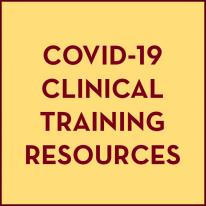
CLINICAL IPE TRAINING NEWS
COVID-19 Clinical Training Resources Page
Check out the Office of Academic Clinical Affairs’ compilation of COVID-19 educational resources you might want to use in your courses or other training opportunities. All resources have been reviewed and vetted by University of Minnesota content experts.
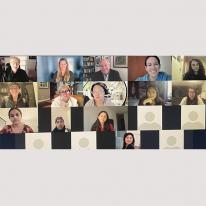
OACA Fireside Chat Brings Interns Together with Local Leaders
“Look for and be open to unexpected partners in your work,” said Tara Dillon, a member of the inaugural cohort of students for OACA’s Interprofessional Internship Program as she describes a key takeaway from the first Fireside Chat that featured Michael Osterholm, PhD, director of the Center for Infectious Disease Research and Policy, and John Finnegan PhD, dean of the School of Public Health. The monthly Fireside Chats provide networking and informal professional development opportunities for the group of interns and feature surprise guests who discuss leadership and interprofessional collaborations. "My base reaction afterward was, 'that was so cool!' I feel very privileged and grateful to have had the opportunity to be part of a wonderful conversation and to learn from Dean Finnegan and Dr. Osterholm's experience and expertise, and to get to see their humanity,” said Dillon. View a recording of the Fireside Chat.
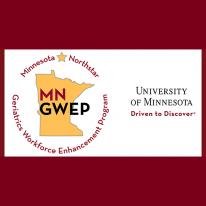
Two Clinics Join Age-Friendly Health Systems, a Nationwide Movement to Improve Health Care for Older Adults
The Institute for Healthcare Improvement recognized M Health Fairview Clinic - Smiley's and University of Minnesota's Community-University Health Care Center as Age-Friendly Health System Participants. Age-Friendly Health Systems is a nationwide movement to improve health care for older adults. Learn about how they're helping to improve health care for older adults in Minnesota.
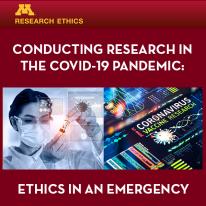
CLINICAL RESEARCH NEWS
Annual Research Ethics Day Webinar
Hear from top national experts at "Conducting Research in the COVID-19 Pandemic: Ethics in an Emergency" on March 3 on how the COVID-19 pandemic is changing research ethics. Experts will discuss how to advance ethics and equity when conducting pandemic research, how to reconcile the need for research with the clinical imperative to save lives, and how the pandemic is affecting research design. Presented by the Office of the Vice President for Research; Consortium on Law and Values in Health, Environment & the Life Sciences; Masonic Cancer Center; and Clinical and Translational Science Institute.

OACA Faculty Research Development Grant Recipients
The OACA Faculty Research Development Grant Program 2020 received 36 applications. A group of 21 reviewers from across the University worked diligently to identify the grant recipients who were awarded up to $200,000 in funds, below:
George Wilcox, PhD, professor, Medical School; and Vadim Gurvich, PhD, MBA, research associate professor, College of Pharmacy
“Synthesis and characterization of a novel bivalent peripherally directed analgesic”
Bryce Binstadt, MD, PhD, associate professor, Medical School; and Jonathan Sachs, PhD, professor, College of Science and Engineering
“Validation and optimization of novel lead compounds for the treatment of arthritis and inflammatory disease”
Armin Rashidi, MD, PhD, assistant professor, Medical School; and Massimo Costalonga, PhD, DMD, associate professor, School of Dentistry
“Establishing periodontitis as a source of bloodstream infection in patients with acute myeloid leukemia”
Kurt Prins, MD, PhD, assistant professor, Medical School; and Melissa Gardner, PhD, associate professor, College of Biological Sciences
“Estrogen Directly Regulates Microtubule Dynamics to Mediate Sex-Differences in Right Ventricular Function”
Lynette Renner, PhD, professor, School of Social Work; and Marizen Ramirez, PhD, MPH, professor, School of Public Health
“School-to-Prison Pipeline to Firearm Violence: Risk Factors and Systems Involvement in Minnesota Youth”
Molly McCue, DVM, MS, PhD, professor, College of Veterinary Medicine; and Suma Jacob, MD, PhD, professor, Medical School
“Developing a Genetic Prediction Assay for Autism Assistance Dogs Informed by Family Needs”
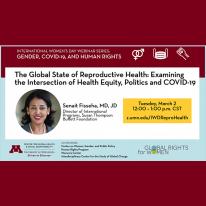
U-WIDE EVENTS AND OPPORTUNITIES
International Women’s Day Series
The Center for Global Health and Social Responsibility is co-hosting “The Global State of Reproductive Health: Examining the Intersection of Health Equity, Politics, and COVID-19” on March 2 as part of their International Women’s Day Series. Senait Fisseha, MD, JD, director of International Programs for the Susan Buffett Foundation, will reflect on the state of reproductive health globally and will discuss the ways in which the COVID pandemic and other political factors have impacted reproductive health services over the last year.
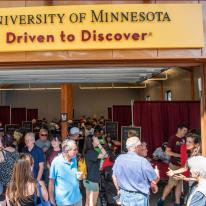
D2D State Fair Research Opportunity: Deadline March 1
There is still room for your study at the D2D Research Facility this summer. D2D is for faculty, students and staff from any department to recruit from among 2 million fairgoers for on-site, human-subjects research. We encourage research teams to apply; no one will be charged fees if the fair is cancelled. A brief online application is due March 1.
